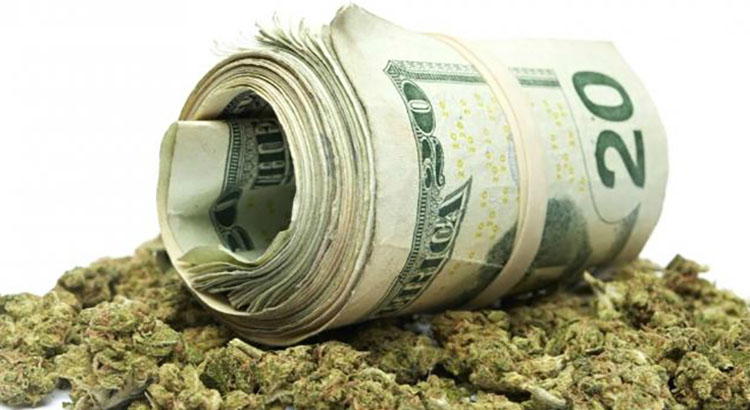It’s no surprise that cannabis is a successful business. It may, however, be a shock to learn that in Oregon alone the recreational cannabis industry brought in $1.2 billion in 2016 alone. To say that cannabis is a booming economic industry is saying it lightly.
“Cannabis is a job-creation machine,” Oregon economist Beau Whitney told Marijuana.com. “On a national basis, the $50 billion cannabis market is essentially the equivalent to the U.S. wine market ($55 billion).” In fact, over 900 businesses were licensed in Oregon in the last year, and 1,225 applicants wait approval. That’s 2,142 recreational cannabis businesses in Oregon alone.
Similarly, in Washington there are over 735 recreationally licensed marijuana businesses operating in the state of Washington, including Fire and Frost Cannabis. That compares to 559 Starbucks locations statewide. Of the licensed businesses, 58% are processors and producers, while 23% are retail locations. And, with so many retail locations, 90% of the population lives within ten miles of a cannabis store. However, between strict location laws and residential approval, it is a challenge for a store to begin operation. This ongoing discussion helps keep cannabis approval ratings high.
In addition to monetary value, cannabis is also adding to the job sector as around 300,000 jobs in the U.S. are currently related to this industry, with the ability to rise to more than one million as states legalize consumption, according to Whitney. This is a drastic boom comparatively to education where 105,000 jobs were created last year and construction, where 219,000 were adding, according to the U.S. Bureau of Labor and Statistics.
And, cannabis is sure to grow in some of the fastest growing cities where the housing market is booming, like Portland and Vancouver. In Vancouver, the price per square foot rose over 11% to $185 and the average price for a home was up to $297,000, according to Trulia. Similarly in Portland, Oregon, where there is a surplus of buyers and a deficit of sellers, the prices of homes continues to increase.
“Inventory in the ballpark of $300,000 is rapidly disappearing as prices far outpace wages, a scenario exacerbated by the continuing fallout of a homebuilding draught,” as stated in an article on Oregonlive.com, as well as “the region’s surging population and the tendency of current homeowners to stay put instead of move up.”
In addition to creating jobs and putting money back into the economy, cannabis funds are contributing positively to the community. According to an article in thenewstribune.com, in the next two years, Washington anticipates raking in $730 million. And, 60% is slated to go toward public health programs, including Medicaid, substance abuse prevention efforts, and health centers. However, some Washington lawmakers, including Senator Ann Rivers, would like some of the funds go toward elementary schools, whose budget continues to drop.
While other politicians, like House Majority Leader Pat Sullivan, thinks the money should go to healthcare as stated in Initiative 502 that legalized recreational marijuana in Washington, this is a good problem to have.
“We can’t ignore public health or access to health care,” said Sullivan, “The initiative that passed dedicated that money to those causes.” However, with marijuana expected to rise $75 million between the state’s next two budget cycles, maybe the law should expand to fund even more public resources provided by the State of Washington.
“Marijuana isn’t our solution to education funding,” said Senator John Braun. “It helps us build a stable and balanced budget, but it’s not a panacea that fixes all our problems,” he added.
And, these positive results continue to benefits future states looking to add legalization bills and will eventually help to convince the federal government to remove cannabis from the Controlled Substance list and officially back states that enable pro cannabis laws.
In addition to monetary figures, it was found that in 2015 – the most recent data available – that over 29 million grams of cannabis were produced in the State of Washington. This is equal to allowing all residents, regardless of age, to receive four grams. And production is only expected to rise.
As loose cannabis sales continue to rise, so do edibles. In 2015, over 731,000 units of edibles were sold and the data continue to show a rise each month since legalization. The top cannabis-infused product has been baked goods like cookies and brownies at 35%, following by general desserts like chocolate, caramels, and brittle at 33%.
Since legalization, Colorado has discovered that cannabis is a stronger economic driver than 90% if its industries. This, we’re learning, is similar in other locations where recreational legalization has come to pass. In fact, it was this realization that spurred passage in places including Washington and Oregon.
Today, cannabis is a numbers game. As medical research continues to discover the many benefits associated with cannabis – improved mood and sleep; decreased pain, anxiety, depression – and it continues to add jobs and funds in states where medical and recreational cannabis is legal, it’s become a game-changer.
Ultimately, the future of cannabis is shifting. Visiting a marijuana dispensary in Vancouver is becoming more normalized and it’s contributing to the economy in ways so dramatic they were unforeseeable. The vast sales show how acceptable cannabis is becoming and at Fire & Frost Cannabis, your marijuana dispensary in Vancouver, we couldn’t be more delighted.
We’ve seen first hand and heard through our customers the wonderful benefits cannabis has contributed to their lives. We recognize the high demand for quality products our customers expect and receive from us. We know there is a growing future for this industry and we can’t wait to see where it takes us next.
There is a marijuana dispensary in Vancouver on every other corner, but with high demand and room for more, we’re glad to be a part of your community and can’t wait until you visit again.



Thank you for your reading. Join the conversation by posting a comment.